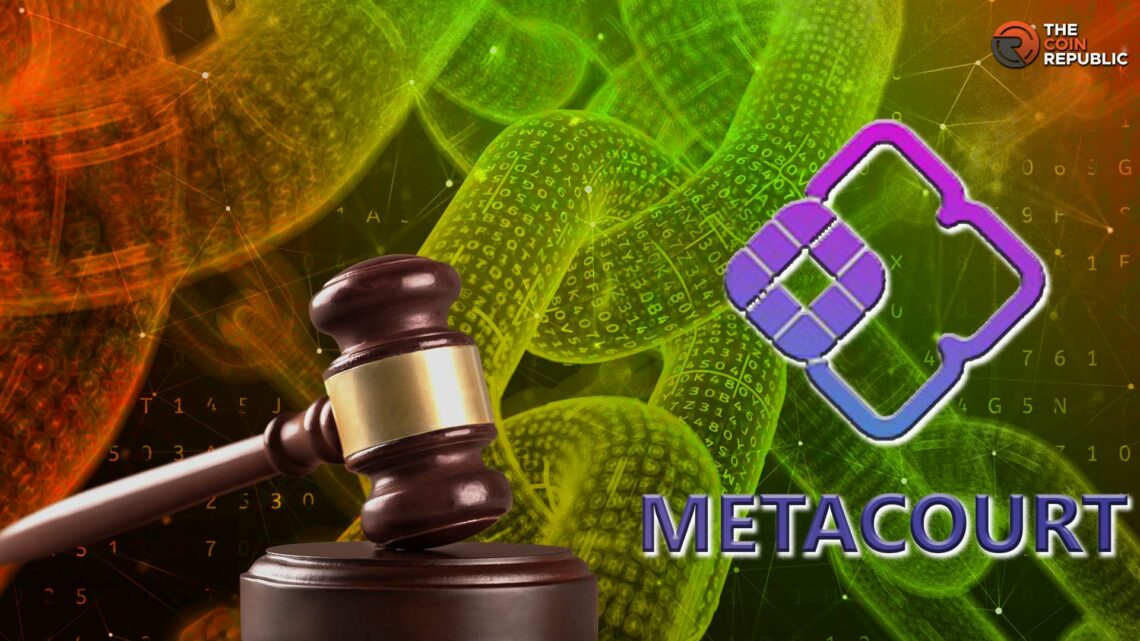- 1 Web3 space is exploding with several kinds of users’ legal conflicts.
- 2 Although useful, traditional legal systems have at times need to be more proficient and informed in resolving Web3 conflicts.
- 3 MetaCourt settles Web3-related disputes in an on-chain ecosystem that is accessible and affordable.
Blockchain technology and Web3 protocols are poised to reimagine the tech-infused world we live in. However, with the rapid evolution of these fields, conflicts, and disputes amongst the users of this decentralized ecosystem are also rising.
Though the traditional legal system is a known route for dispute resolution, its suitability to tackle the quirky legal challenges of Web3 space has been questioned. Metacourt, a new on-chain legal system, aims to counter these issues by offering efficient, affordable, and transparent legal services.
Technological Revolution of the Legal Industry with MetaCourt
Web3 is a complex ecosystem powered by decentralized blockchain technology, smart contracts, Decentralized Autonomous Organizations (DAOs), and cryptocurrencies. The technique has offered invaluable opportunities to investors and users alike. Though Web3 is continuously growing in popularity, users’ legal disputes in the ecosystem are also soaring exponentially.
User conflicts in Web3 could arise due to various reasons, e.g., criminal hacks, private law disagreements, and regulatory disputes. Other challenges like malfunctioning smart contract codes, altercations regarding DAO’s governance process, and interactions with centralized and decentralized exchanges, can also give rise to disputes. Moreover, with the growth of the metaverse, conflicts can emerge based on the issues of transferability and ownership of non-fungible tokens (NFTs).
Since Web3 disputes are inevitable, consumers of the virtual realm predominantly rely on the legal system designed to oversee the physical world. To resolve these feuds, conventional arbitration utilizes approaches, such as standard contractual relationships and traditional forums.
However, traditional legal infrastructure is ill-equipped to comprehensively address the complications of on-chain legal disputes. A major issue in using traditional systems for Web3 is the lack of anonymity around the identity of involved parties, which can lead to prejudice in judiciary decisions.
Additionally, conventional legal proceedings are time-consuming, expensive, and non-enforceable. These features hinder the capability of traditional systems to resolve legal feuds of Web3 masses. Another crucial challenge with these legal services is the limited or insufficient knowledge and expertise of judges in the field of blockchain and Web3 protocols.
Owing to these issues, the deployment of an on-chain legal system is the need of the hour. MetaCourt is a Web3-based affordable alternative to traditional legal services that promise to resolve disputes digitally. As per its official website, it serves as a “gateway to a secure and comprehensive range of legal services for the blockchain universe.”
MetaCourt: On-Chain Justice Protocol For Web3 Space
As the popularity of Web3 grows at a breakneck speed, its integration with the legal industry was just a matter of time. MetaCourt, a groundbreaking project, has been designed to leverage the features of the underlying technologies of Web3 to settle disputes in the blockchain world.
The initiative aims to create a global blockchain space that is fair, impartial, accessible, and more importantly, affordable. MetaCourt has an official native token, $COURT that can be utilized for various purposes, e.g., transactions, voting, staking, governance, and on-chain arbitration.
MetaCourt is a decentralized legal ecosystem that offers a multitude of legal services to its users. The platform tackles the growing number of user conflicts on Web3 via on-chain dispute resolution. This novel strategy provides users with greater access to justice as it is cost-effective, efficient, and transparent, unlike traditional legal systems. It exploits the power of blockchain, artificial intelligence (AI), virtual reality (VR), and Metaverse to restore the faith of users in the judicial system.
As previously mentioned, traditional legal systems are quite unreliable since evaluating the Web3 expertise of arbitrators is hard. Other blockchain-based arbitration procedures employ game theory as a trust mechanism but ignore other criteria for choosing a juror or a panelist. MetaCourt platform plans to resolve these challenges by using game theory-based arbitration alongside a jurors’ intelligent rating system.
This will ensure that people’s conflicts are getting settled by MetaCourt panelists who have enough knowledge and expertise in specific Web3 categories. With this feature, people and companies can leverage the best possible legal services of MetaCourt to solve their blockchain, metaverse, and NFT-related disputes.
Additionally, the team has in its future plans to launch a first-ever mini-legal metaverse. This will be offered with a Meta Law school, a novel initiative to provide education about Web3 and law.
Since the blockchain industry is in its fledgling phase, Web3 disagreements and conflicts are only going to rise. However, MetaCourt can serve as an accessible and affordable on-chain legal platform where users can have their conflicts settled in a safe environment.

With a background in journalism, Ritika Sharma has worked with many reputed media firms focusing on general news such as politics and crime. She joined The Coin Republic as a reporter for crypto, and found a great passion for cryptocurrency, Web3, NFTs and other digital assets. She spends a lot of time researching and delving deeper into these concepts around the clock, and is a strong advocate for women in STEM.


 Home
Home News
News









